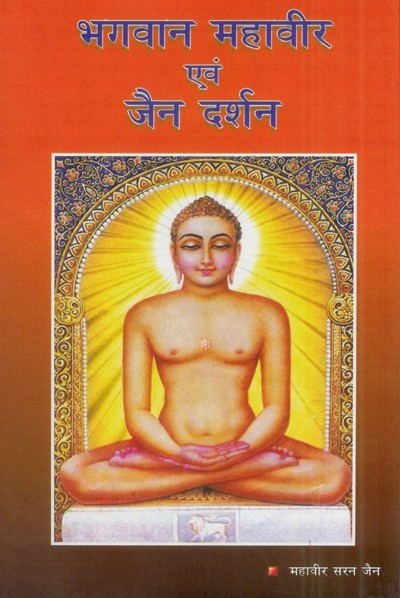Ahiṁsā (Non-violence) (अहिंसा):Indulgence in sins is the non-abstinence. The sins are absolutely renounced in the condition of vows. Violence, lying, theft, infidelity, acquisitiveness or dissatisfaction all are non-vows. The renunciation of violence, speaking truth, renunciation of theft, celibacy, renunciation of acquisitiveness - these are five great vows.
हिंसा विरदिसच्चं, अदत्तपरिवज्जणं च बंभं च।
संग विमुत्तो य तहा, महाव्वया पंच पण्णत्ता।।
Hiṁsā viradisaccaṁ, adattāparivajjaṇaṁ ca baṁbhaṁ ca.
saṁga vimuttiī ya tahā, mahāvvayā paṅca paṇṇattā...
(Acārya Vattakera: Mūlācāra, 4/1/ 6)
On increasing of the self-purification, the pessimistic meaning of these vows is turns to be positivistic. The capacity to practice these vows increases. Amongst all five vows the renunciation of violence is first great vow. When the renunciation of violence is considered to be 'the nonviolence is a great religion' the meaning of this does not remain limited up to non-killing. In this situation, after becoming passion free the emotion of a person for equanimity blooms; and a consciousness develops in him that all souls are like his soul. From this view point, deliberation regarding of great-vows (महाव्रत) is mentioned herewith:
Truth (सत्य):The verbal meaning of violence is not to do violence (Hiṁsā). From this point of view, not to kill any creature is not to do Hiṁsā. Let us see this verse:
एवं खु नाणिणो सारं, जं न हिंसई किंचण
Evaṁ khu ṇāṇiṇo sāraṁ, jam ṇa hiṁsī kincaṇa
(Not killing to any creature is the essence of becoming a knowledgeable person.)
(Sūtrakṛtāṅga, 1/11/10)
The meaning of non-violence, during the austerity is - willing to do welfare of all creatures. At the time when a person wishes welfare to all creatures of the world, all creatures, at the same time, become for him equal, as if, they are his own soul. He, at the same time, neither possesses attachment nor aversion in his mind for anyone. In this point of view, the stoppage of the origin of attachment and aversion, in the mind, is non-violence. On being solidified the thinking of all being are equal, the sense of equanimity takes place in the soul replacing the sense of attachment and aversions. Therefore, the equal love or harmony with all creatures is the nonviolence. It is said, "Impartiality towards all beings in the world, whether friends or enemies, and abstention from injury to living beings throughout the whole life "
समया सव्व भूएसु।
'Samayā savva bhūyesu'
(The Uttarādhyayana Sūtra, 19/25)
Non-stealing (अस्तेय):All spiritual leaders or monk-scholars of this world have severely criticized the false speaking. Speaking untruth earns defame, increases mutual enmity and develops affliction in mind. A self-aspirant searches truth through his soul. Search of truth starts with the attainment of righteousness. After cutting all bondages of non-righteousness an aspirant attains the right knowledge of substances; and a kind of faith gets developed in that. And he takes vow of not speaking lie.
In order to protect and strengthen the non-violence an aspirant never speaks such a harsh language which creates pain for others.
तहेव फरुसा भासा, गुरुभूओ बाघइणी।
Taheva farusā bhāsā, gurubhūo bāghaiṇī̄.
(Daśavaikālika, 7/11)
The word which makes anyone feel hurt, makes feel fear makes feel regret, creates enmity, grief and clash, moreover, and creates miseries for others all these words are unpleasant. An aspirant should not speak such words. On speaking such words others get hurt. An aspirant ought to speak such true words which prove to be benevolent, friendly and acceptable to others. A man speaks lie being impressed by greed and other perverted thoughts. When an aspirant conquers over his passions, the speaking truth becomes his habit. Being inspired by the vision of 'self is equal to other self' and being prosperous with true emotions, the jīva becomes able to establish friendship with the all creatures of the world. That is why Lord Mahāvīra has preached us:
सया सच्चेण सम्पन्ने मेतिं भूएसुकप्पए
'Sayā sacceṇa saṁpanne mettiṁ bhūyesukappaye'
(Whose soul is always prosperous with true emotions, he ought to keep the friendship with the all creatures of the world).
(Sūtrakṛtāṅga, 1/15/3)
Celibacy (ब्रह्मचर्य):Possession of a thing which is not given you is the stealing. The stealing is a crime. A man steals and lies becomes thief being motivated by the greed and other fermented thoughts. Having that thing which is not given you makes its owner perturbed and sad. The stealing can be the cause of death. A feeling of fear takes place in minds of both one who steals and one whose thing is stolen. The person whose thing is stolen thinks to keep rest of things safe lest those should also be stolen. The thief fears lest he should be caught. The stealing is a sin. The habit of stealing causes to greed to steal other's prosperity. The background of righteousness breaks into pieces. The tendency of greed works as motivating force behind the stealing. The habit of stealing originates passions in the soul. Stealing causes defame, it is antisocial and punishable act and is condemned by the noble people. This is divisive act for dears and friends. Unless the vow of non-stealing is practiced honestly, the sense of friendship cannot be established for creatures of the world.
It is said in Jain texts that a shramaṇa (श्रमण) or monk, having loyalty in the vow of non-stealing, does not take even a piece of grass to clean his teeth without the permission of its owner:
चित्तमंतमचित्तं वा, अप्पं वा जइ वा बहुं।
दंतसोहणमेत्तं पि, ओग्गहंसि अजाइया।।
Cittamantamacittaṁ va, appaṁ vā jai vā bahuṁ..
Dantasohaṇamettaṁ pi, oggahansi ajaiyā .चित्तवदचित्तवद्वा, अल्पं वा यदि वा बहु।
दन्तशोधनमात्रमपि, अवग्रहे अयाचित्वा ।।
(Nothing whether animate or inanimate, whether cheap or dear, nay, not even a tooth-brushing piece-of-stick (is to be taken) without being asked or, while staying at a place fixed for residence.)(Samaṇa Suttam, 371)
Aparigraha (non-possession) (अपरिग्रह):The person who has lust, he cannot be a true shramaṇa (श्रमण) or monk. A shramaṇa (श्रमण) or monk has to follow pure celibacy. Therefore the statement of Lord Mahāvīra is -
स इसी, स मुणी, स संजए, स एव भिक्खु, जे सुद्धं चरइ बंभचेरं।
Sa isī, sa muṇī, sa saṅjaye, sa eva bhikkhū,
Je sudḍhaṁ carai baṁbhaceraṁ
(That is seer, that is muni, that is restraint and that is bhikṣu who practices pure celibacy).
(Praśna Vyākaraṇa, 4/1)
It is necessary to conquer over the attachment. For this the passions and lusts are necessary to be overcome. The aim of the shramaṇa (श्रमण) or monk is to attain emancipation. And for him only jīvātmā is the Brahma. The attainment of true form of jīvātmā is his main aim. The ultimate aim of a great-vowed shramaṇa (श्रमण) or monk is celibacy. "Only jīvātmā is the Brahma. Being free from the business of the body monk only remains absorbed in, this is his celibacy".
जीवो बंभा जीवम्मि चेव, चरिया हविज्ज जा जदिणो।
तं जाण बंभचेरं, विमुक्कपरदेहितित्तिस्स।।
Jīvo baṁbhā jīvammi ceva, cariā havijja jā jadiṇo
taṁ jāṇa bamhaceraṁ, vimukkapardehatittissa...
(Ācārya Śivārya: Bhagavati Arādhana or Mūlārādhana, Gātha 878)
Lord Mahāvīra identified miss-consequences of the acquisitiveness. He noticed that there was no bigger forgery for the creatures in this world than the acquisitiveness. We hoard the outward things we keep on adorn our body considering this is my body because of the greed, the attachment, the attraction which is in us. We keep on accumulating the karmic particles due to our habit of attachment and malevolence. If, we need freedom from karmic bondage we will have to strengthen the habit of renunciation than the hoarding of materialistic things. If we have desire to see inner self we will have to keep aside the ignorance and greed of hoarding materialistic things. The attachment in materialistic things like body etc. is acquisitiveness (parigraha), and the knowledge that the soul is distinct from body only is the foundation of Aparigraha (nonpossession). The detachment from hoarding things is the compulsory to pave the ground of righteousness. That is why Lord Mahāvīra had stated that the monk who wants to accumulate things ignoring the code of conduct, he is not a monk but is only a householder:
जे सिया सन्निहीकामे, गिही पव्वइए न से।
Je siyā sannihīkāme, gihī pavvaiye na se.
(Daśavaikālika, 6/18)
Until the attachment is in the worldly things, a monk cannot practice the vow of Aparigraha (non-possession) and can't renounce the habit of acquisitiveness. The aspirant who has attraction with sense of owing in the worldly things he cannot renounce the acquisition (parigraha). More the acquisition provokes more the violence. An individual lies for acquisition; steals for the same. It is necessary to become a shramaṇa (श्रमण) or monk that he must remain detached from sexual pleasure. It is necessary to become a shramaṇa (श्रमण) or monk to dilute the attraction from worldly pleasures. A shramaṇa (श्रमण) or monk makes distinction between self and outer world. His faith becomes solid for that. He is flowing into world-flow only because of his attraction in non-righteousness. For the freedom from karmic bondage he has to swim in opposite direction from world-flow. An aspirant has to practice repentance (pratikramaṇa). Lord Mahāvīra chose the path of repentance, penance and austerity. His path was the path of enlightenment. He left aside the worldly pleasures. His path was the path to eternal bliss. His aspiration is the evidence of the fact that he had not even a particle of charm and attachment in worldly matters. The Lord owing to his self-experiences stated that the person who can renounce attachment he only can renounce acquisition:
जे ममाइअ मइं जहाइ, से जहाइ ममाइअं ।
Je mamāia maiṁ jahāi, se jahāi mamāiaṁ.
(Acārāṅga, 2/6)
One who possesses things beyond limit commits violence. This is only sense of unlimited acquisitiveness which creates economic inequality. The name of economic violence is acquisitiveness. The non-violence in the field of production, distribution, and consumption of goods and services is Aparigraha (nonpossession). The fire of passion is non-celibacy. The consumerist passions are acquisitiveness. The karma does not bind any jīva whereas it is jiva who binds him with karmas being influenced by passions like attachment and aversion. It is said in Jain texts that a person, who has a passionately desire he is never satisfied. His craving for many movable and immovable things grows stronger and stronger. He becomes discontent and unhappy. His deceit and falsehood increase on account of his greed. But one who is indifferent to attachment and aversion, is free from sorrows; though still in the Saṁsāra, is not affected by that long succession of pains, just as the leaf of the lotus is not moistened by water. Thus the objects of the senses and of the mind cause pain to passionate parsons, but they never in the least cause any pain to the dispassionate. Pleasant things, by themselves, do not cause passions; but by either hating or loving them, a person undergoes such a change through delusion. "Only elimination of the desires is elimination of the sorrows. The passions like ignorance, non-righteousness and attachment etc. arise in a person who is attached to pleasures."
न काम भोगा समयं उवेंति, न यावि भोगा विगइं उवेंति।
जे तप्पओसी य परिग्गही य, सो तोसु मोहा विगइं उवेइ।।
Na kāma bhogā samayaṁ uventi, na yāvi bhogā vigaiṁ uventi.
Je tappaosī ya pariggahī ya, so tosu mohā vigaiṁ uvei...
(The Uttarādhyayana Sūtra, 32/101)
 Dr. Mahavir Saran Jain
Dr. Mahavir Saran Jain
